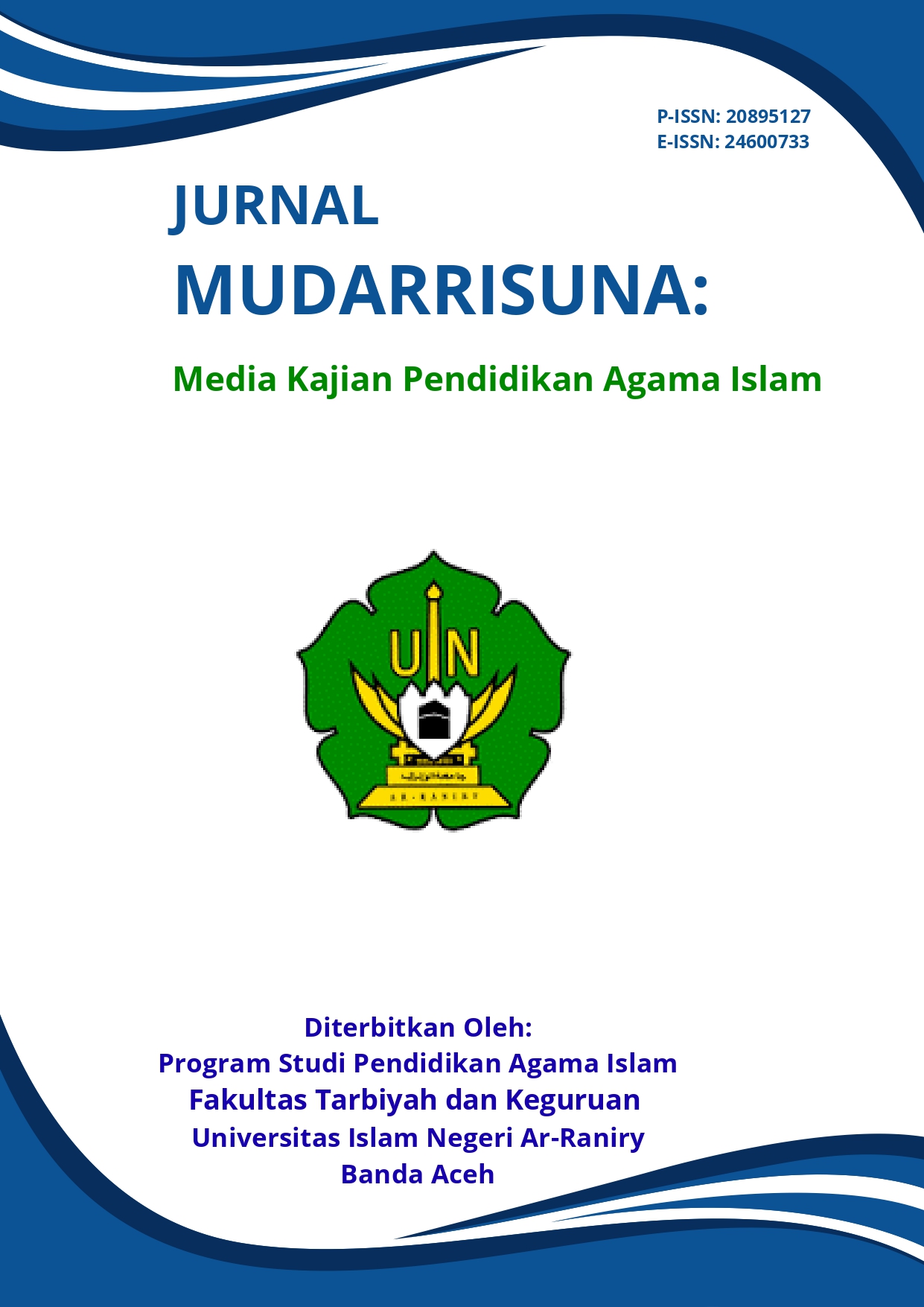Adopsi Digital Twin dalam Pendidikan Agama Islam di Perguruan Tinggi: Peluang dan Tantangan
DOI:
https://doi.org/10.22373/jm.v15i1.24715Keywords:
Digital Twin, Pendidikan Agama Islam, Perguruan TinggiAbstract
Tujuan penelitian ini adalah untuk mengeksplor peluang dan tantangan digital twin sebagai pembaharuan teknologi yang dapat diadaptasikan dengan Pendidikan Agama Islam. Hal ini menjadikan Pendidikan Agama Islam sebagai ranah yang selalu bisa dijangkau dengan berbagai kemudahan sesuai dengan kemajuan zaman. Kajian ini menggunakan jenis penelitian kualitatif deskriptif dengan pendekatan studi pustaka (library research) dengan model analisis data deskriptif. Hasil penelitian ini adalah digital twin pada ranah Pendidikan Agama Islam memiliki potensi kontribusinya yang dalam hal ini, menjadi komponen pembelajaran di kelas maupun sebagai pembantu untuk menaganalisis Keputusan dalam sistem Pendidikan. Sedangkan tantangannya, insfrastruktur dan sumber daya manusia pada konteks ini masih sangat kurang.
References
Carvajal, Carlos A. R. & Arenas , Natalia A. G, (2022), “Approach to digital transformation in higher education institutions through the theory of change” International Conference Knowledge-Based Organization 10(17)
Bloom, Rafael dan Liguori, Guiliano, (2023). Bangkitnya Digital Twin: Senjata Rahasia untuk Operasi di Tingkat Lebih Tinggi, (Fountain Valley: Kingston Technology Corporation, 2023)
Arnas, Whulanza Yudan, Kusrini, Eny, (2024). “Unveiling Innovations Across Multidisciplinary Horizons”, International Journal of Technology, 15(2)
Yashin, Sergei, & Yashina, Nadezha, dkk. (2023). “Neural Simulation of Digital Twin of Top Management Motivation Mechanism in Regional Government Agencies” International Journal of Technology, 14(8)
Lutters, Eric & Damgrave Roy, (2023). “Digital Twinning as the basis for integration of education and research in a learning factory”, Procedia CIRP
Mashly, Maggie, (2024). “Connecting the Twins: A Review on Digital Twin Technology & its Networking Requirements”, Procedia Computer Science,
Agca, Ridvan Kagan, (2023). “Using Digital Twins In Educations From An Innovative Perspective: Potential And Aplications” Educations Mind, 2(2), 2023
Munadi, Tugino, Muhammad & Khuriyah, (2023). “Pengaplikasian Teknologi Digital dalam Pembelajaran PAI dan Bahasa Arab”, Innovative: Journal Of Social Science Research, 3(2)
Tlili, Ahmed, Huang, Ronghuai, dkk (2023). “Speaking of transparency: Are all Artificial Intelligence (AI) literature reviews in education transparent? “, Journal of Applied Learning & Teaching, 6(2)
Mas’ula, Wahibatul & Hakim, Ahmad Muzakki, (2023). “Islamic Education In The Era Of Digitalization 5.0“, Proceding of International Conference on Edycation, Society and Humanity, 1(1)
Nofrianti, Yeri & Afirmiboy, “Challenges and Problems of Learning Islamic Religious Education in the Digital Era”, Islam Transformatif: Journal of Islamic Studies, 5(1), (2021).
Suandi, Ari, (2024). “Urgensi Peran Pemimpin dalam Manajemen Perubahan di Lingkungan Organisasi Pendidikan Islam: Sebuah Analisis Konseptual” Nusantara: Jurnal Pendidikan Indonesia Vol. 4(2)
Sulistianingsih, Dewi, Setiawan, Andry,. Prabowo, Muchammad Shidqon, (2021). “Potret Tumpuan Perguruan Tinggi dalam Upaya Alih Teknologi”, Seminar Nasional Hukum Universitas Negeri Semarang, 7(2)
Javaid, Moh., Halim, Abid., Suman, Rajiv., (2023) “Digital Twin applications toward Industry 4.0: A Review”, Cognitive Robotics
Addanki, Khanti & Corrin, Linda, (2023). “Unveiling the potential of Digital Twin technology for Higher Education”, Ascilite 2023: People, Partnership and Pedagogies
Hananto, April Lia, Djamari, Djati Wibowo & Soudagar, Manzoore E. M. (2024). “Digital Twin and 3D Digital Twin: Concepts, Applications, and Challenges in Industry 4.0 for Digital Twin”, Computers
Lizar, Yuslinda., Novizam, Defa Mal, (2023). dkk. “Tren Global Penelitian Tentang Digital Twin: Analisis Bibliometrik”. Indonesian Journal of Computer Science
Kartashova, Liubov A., Gurzhii, Andri M., dkk. (2020). “Digital Twin of an Educational Institution: An Innovative Concept of Blended Learning”, Proceedings of the 1st Symposium on Advances in Educational Technology (AET)
Pathak, Rakesh Kumar & Upadhyay, Prakash, (2024). “Integration of Digital Twins Technologies in Education for Experiential Learning: Benefit and Challenges” International Research Journal on Advanced Engoneering Hub (IRJAEH)
Tjahyadi, Hendra, Prasetya, Kusno & Murwantara, I. Made, (2023). “Digital Twin Based Laboratory for Control Engineering Education” International Journal of Information and Education Technology
Chamorro-Atalaya, Omar, Velasquez Carlos H. F., dkk. (2024). “Use of Digital Twin Technology in the Teaching-Learning Process, in the field of University Education: A Bibliometric Review”, International Journal of Learning, Teaching and Educational Research, 23(2)
Damola, Precious, Miracle, Agboola, (2024).“The Role Of Digital Twin In The Industry”
González, Carlos M. T., (2023). “Gemelos digitales aplicados a la biomedicine”, Canarias Pediátrica, 47(2)
Addanki, Khanti & Corrin, Linda, (2023). “Unveiling the potential of Digital Twin technology for Higher Education”, Ascilite 2023: People, Partnership and Pedagogies
Downloads
Published
Issue
Section
License
Jurnal MUDARRISUNA: Media Kajian Pendidikan Agama Islam allows the author(s) to hold the copyright and to retain the publishing rights without restrictions. Authors who publish in this journal agree to the following terms:
- Authors retain copyright and grant the journal right of first publication with the work simultaneously licensed under a Creative Commons Attribution-ShareAlike 4.0 International License that allows others to share the work with an acknowledgment of the work's authorship and initial publication in this journal.
- Authors are able to enter into separate, additional contractual arrangements for the non-exclusive distribution of the journal's published version of the work (e.g., post it to an institutional repository or publish it in a book), with an acknowledgment of its initial publication in this journal.
- Authors are permitted and encouraged to post their work online (e.g., in institutional repositories or on their website) prior to and during the submission process, as it can lead to productive exchanges, as well as earlier and greater citation of published work.




